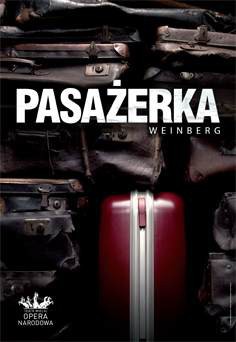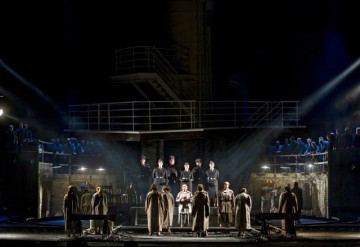1.
Contemporary art has effectively taught us not to become too accustomed to soothing and worn mental clichés. Every now and then an artist challenges our perception, turning our thinking about the past upside down. Forcing us to undergo subversive therapy. The shocks are of various calibre and weight.
Not all ideas are equally convincing and some artists obviously mistake art for journalism. But it is good they exist at all because at least they do not let us fall asleep. And collective dreaming (with all the appearances of being lively awake) is one of the epoch’s trademarks, is it not?
Smiling and handsome Nazis in film shots (Uklański); a comic book about the artist’s father’s camp experiences (Spiegelman); a Lego concentration camp (Libera); a Jewish commando unit scalping their German oppressors (Tarantino) – to mention but a few important and widely discussed artistic events of recent years. In the field of art, the war goes on. And, as a result, so does our thinking about it.
The events mentioned above have already been more or less well digested. And now against this background suddenly appears Mieczysław Weinberg’s opera The Passenger. A work brought out of limbo, out of oblivion. It was written in 1968 in the Soviet Union, based on a novel recounting the camp experiences of Polish Zofia Posmysz, to a libretto by Alexander Medvedev. Due to its political incorrectness, the opera was immediately shelved. In this situation, even the “masterpiece” stamp put on it by Shostakovich could not help. Analogies between a story about a Nazi camp and the world of the Gulag seemed to striking to the regime for Weinberg’s work to be allowed to surface.
2.
And so, an opera about Auschwitz. Let’s say that one more time, out loud. An opera. About Auschwitz. A mind-boggling thing. Falling beyond rational thinking and routine expectations. Something that could be situated halfway between impossibility and impropriety. And, incidentally, an open betrayal of Adorno’s famous ultimate formula.
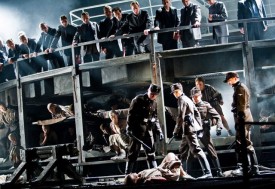 Photo Krzysztof BielińskiThe very phrase wakes us up from lethargy. And it is not difficult to understand why. The surrealism of a juxtaposition of operatic art and concentration camp reality is so great that it at first evokes incredulity and consternation. The chasm between opera’s alleged artificiality and the brutal realities of camp life means that news of an opera project dealing with camp horrors is met with disbelief rather than curiosity. And perhaps embarrassment-streaked fear too. What will people not do, really? They will even make genocide a basis for opera. You cannot help but think about this context when watching and listening to Weinberg’s work.
Photo Krzysztof BielińskiThe very phrase wakes us up from lethargy. And it is not difficult to understand why. The surrealism of a juxtaposition of operatic art and concentration camp reality is so great that it at first evokes incredulity and consternation. The chasm between opera’s alleged artificiality and the brutal realities of camp life means that news of an opera project dealing with camp horrors is met with disbelief rather than curiosity. And perhaps embarrassment-streaked fear too. What will people not do, really? They will even make genocide a basis for opera. You cannot help but think about this context when watching and listening to Weinberg’s work.
Nevertheless, let us try to enter this world.
On the textual level, The Passenger is a story above all about memory and guilt. About repressed memory and German guilt. About pangs of conscience that continue to gnaw. About grotesque attempts at self-justification. About cheap attempts to shift to responsibility onto somebody else. About years of silence. About falsifying yourself and the world. It is a story about Lisa, an ordinary German woman (“ordinary” as in Christopher Browning’s famous book), whom fate has assigned the role of a concentration camp warden. An unexpected meeting, years later, aboard an ocean liner, with Marta, an inmate from her ward, becomes the beginning of a return to the past. A brutal return. Covers fall. Masks disappear. The time comes to honestly face her own incarnation from years ago. The time comes to somehow explain to her husband the strange anxiety and irritation.
The musical story unfolds on two levels. In the 1960s, on a ship. And in the 1940s, in the camp. There is an intended asymmetry between the two. The ship is majestic. Beautiful and white. Elegant couples wander around the decks. Conversations, drinks, and dances. The idyll of sea voyage. In the camp, there are railway tracks and a ramp. Shaved heads, bunk beds, and striped uniforms as parodies of clothing. A searchlight between the eyes, shouting, beating, humiliation. And death as a certainty. The action takes place aboard the ship only to shift, a moment later, to the dark abyss beneath. To the vaults, into the camp world, the world beyond, or an anti-world. And again to the ship, and again under the deck…
3.
In the post-war psychomachy that the opera’s authors present, the two main characters, Lisa and Marta, are not the only protagonists. Another (supposed) protagonist is the viewer. This stage parcel is addressed to them and at them. So how does The Passenger work for the viewer today? Did David Pountney’s staging in Warsaw (earlier in Bregenz, soon in London and Madrid) touch something important in us? Did it really pierce us to the bone? It is awkward to speak for others. Let me describe my own reflections.
The opera is a synthesis of the word (literature), gesture (theatre) and sound (music). It is – or should be – a synthesis of these three elements, cohesive and complete. The three levels define the three problems of The Passenger.
The fundamental one, in my view, is that it does not portray – as opera has been doing since its Florentine-Venetian beginnings – mythical protagonists living their mythical passions in mythical spaces. In other words, it does not use words, sets, and singing to talk about imaginary worlds, mythological or literary.
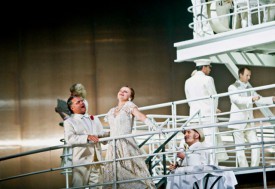 Photo Krzysztof BielińskiThe story of Zofia Posmysz talks about specific people, living and dying in a specific place. This place is called Auschwitz. It is not, as we often say, hell, because hell is where bad people go and there, in the death camp, completely innocent people died. So what is it? In her review of Imre Kertész’s book, Agnes Heller wrote that that in order to touch that reality in its core, one would have to invent a new name for it. Such as: Auschwitz. This statement reveals the scale of difficulties that today’s art (any art) faces when it tries to stand up to a reality that there is no word to describe. A reality that is its own tautology.
Photo Krzysztof BielińskiThe story of Zofia Posmysz talks about specific people, living and dying in a specific place. This place is called Auschwitz. It is not, as we often say, hell, because hell is where bad people go and there, in the death camp, completely innocent people died. So what is it? In her review of Imre Kertész’s book, Agnes Heller wrote that that in order to touch that reality in its core, one would have to invent a new name for it. Such as: Auschwitz. This statement reveals the scale of difficulties that today’s art (any art) faces when it tries to stand up to a reality that there is no word to describe. A reality that is its own tautology.
This is perhaps why the camp scenes, played out in a true-to-life manner, were so unconvincing for me. The authors failed to find a stage language to render that reality (whether this is possible at all in another matter). This is perhaps the most distinct difference between film and theatre. In a motion picture (vide the Andrzej Munk film based on the same story), achieving the reality effect is much easier. Of course, cinema lies too – but it lies better. Theatre, and opera theatre in particular, if it goes literal, inevitably slips on the verge of artificiality, losing credibility in its performances of sorrow, pain and suffering. Symptomatically, what passes in the literary sequences (the ship scenes), becomes at times almost unbearable in the scenes of camp life.
Problem number two: the text. Today, when we have read Kertész, Levi, Amery, Agamben or, from a slightly different area, Littell, is the intellectual charge of Weinberg’s work truly significant? We already know a lot about camp life. Of course, this kind of repetition is never enough, although it needs to be said that in this aspect The Passenger does not really defend itself either. It seems that the dilemmas voiced in the text do not discover any completely unknown territory. Of course, it is not the authors’ fault that the opera had to wait thirty years for its premiere. More than that: I have no doubt that if it had been allowed to premiere then, it would have been an important voice in the discourse on the post-camp world, on the complex executioner-victim relations, on conscience, forgiveness, the perpetrators’ guilt and responsibility.
Remaining for a moment with the libretto, at this weird junction of fiction and realness, I am not sure if someone has noticed a certain thing. The warden of the female ward is portrayed under her real surname: Franz. We know from elsewhere that she survived the war but was never put on trial. Her name, though, had been recorded by Zofia Posmysz who made her the protagonist of her fictional story. What I want to say is that as long we read this text, as long as the opera is staged, the name will always refer to a real person. And the camp stigma will always be on that person. Like a sentence in her life after life, passed by the victims but never executed.
4.
And the third problem, the music. That is that which, I believe, is the most important in Weinberg’s work. But here too a problem arises. Speaking of music, I do not mean just the musical value of the work. The purely musicological level: how, for instance, Weinberg’s musical language compares with that of his contemporaries, how it presents itself against the operas of Britten or Shostakovich. The issue is much subtler. Music, besides its narrative and creative functions, is also an important part of the represented world. It plays a crucial semantic role in it.
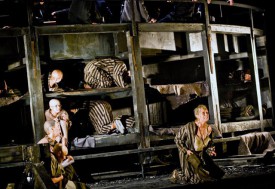 Photo Krzysztof BielińskiThe opera’s climax scene is the performance of one of the prisoners, Tadeusz, Marta’s fiancé and a violinist. He is ordered by the camp commander to prepare and publicly perform a waltz. His favourite waltz. Tadeusz starts playing. But instead of a medley of waltzes we get Bach’s Chaconne from the Partita in D minor. The surprise is complete. Both for the SS expecting Viennese sweetness and for us, the viewers. Bach’s music pierces through this oppressive world. It is an independent voice from above. From a space that death and humiliation have no access to. In the camp world of constraint and necessity, the Chaconne’s sounds are a voice from an absolutely free world. It is like punching a hole in a tight dead end.
Photo Krzysztof BielińskiThe opera’s climax scene is the performance of one of the prisoners, Tadeusz, Marta’s fiancé and a violinist. He is ordered by the camp commander to prepare and publicly perform a waltz. His favourite waltz. Tadeusz starts playing. But instead of a medley of waltzes we get Bach’s Chaconne from the Partita in D minor. The surprise is complete. Both for the SS expecting Viennese sweetness and for us, the viewers. Bach’s music pierces through this oppressive world. It is an independent voice from above. From a space that death and humiliation have no access to. In the camp world of constraint and necessity, the Chaconne’s sounds are a voice from an absolutely free world. It is like punching a hole in a tight dead end.
Pascal Quignard’s unique La Haine de la Musique begins with a sentence that stays with you: “Music is the only one of all arts that collaborated in the extermination of Jews organised by the Germans between 1933 and 1945.” Then it only gets worse. The author cites dozens of examples showing how the music used in the camps by the German perpetrators became an unbearable burden for the victims, how it inspired hatred in them, how they demanded that the orchestra stop playing. In a world turned upside down, music too became an anti-value.
I mention Quignard’s text because listening to the finale Chaconne, I felt as if music was redeeming the burden of past guilt. Not its own guilt. Although music cannot revive anyone, it is a voice of memory; a token of memory’s victory over oblivion. Is Marta’s requesting a Viennese waltz with the ship band not the same gesture, restoring faded memory? A waltz ordered with a clear dedication. A waltz of remembrance, of sweet vengeance perhaps. It is precisely the sounds of this music that cause Lisa to undergo an accelerated anamnesis.
And that is also a victory of the opera itself. Because it was written precisely for this – and only this – reason. To remember. There is no forgiveness, the chorus sings. If your voices fall silent, Marta sings in the Epilogue, we will all be lost (she thus evokes the words of poet Paul Eluard which serve as the motto of this opera: “If the echo of their voices should fade, we shall perish”). Black wall, black wall, the chorus chants. Like a symbol of cognitive impossibility and a memento for eternity.
5.
Perhaps operas such as The Passenger should not be measured solely with art’s standards. The measure of the heart appears more important here.
To Professor Michał Bristiger.

